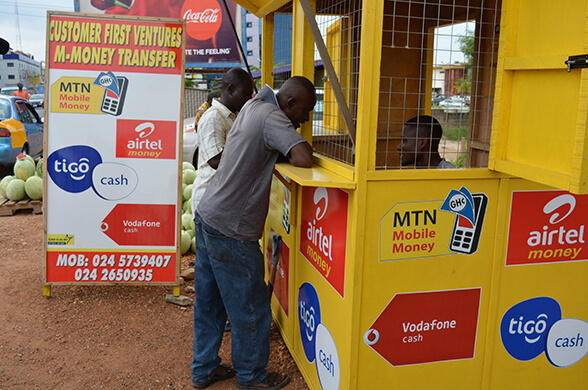The Institute of Statistics, Social, and Economic Research has indicated that the new restriction on mobile money (MoMo) transactions could derail the digitisation of micro, small, and medium-sized enterprises and progress in the cash-lite economy.
In a press statement, the Institute acknowledged that the proposed rate would have a minimal impact on small-value transactions.
However, ISSER noted that the move would adversely impact micro, small, and medium enterprises that rely on MoMo for their financial transactions.
“Worthy of attention is the potential impact on micro and small enterprises, especially traders and farmers within the agricultural value chains concentrated in rural areas.
"For these segments, especially traders and transporters of foodstuffs who rely on MoMo to address security concerns with carrying cash across the country, an increase in cost is likely to be transferred to consumers,” the statement said.
This move, the institute said, could be a trigger for both food and non-food inflation.
The institute raised concern that beyond the move to restrict MoMo transactions, the developing social media-driven e-commerce ecosystem, which relies on MoMo for payment, would also see the transfer of the revised charges to consumers.
“As service providers on the various e-commerce platforms will pass on the charges to consumers in the form of increased prices of goods and services,” the statement said.
In a joint statement copied to the media, MoMo agents around Ghana said they would implement a temporary measure that limits cash withdrawals to GH¢ 1,000 per transaction from December 1.
ISSER said that the potential impact of the restrictions might be significant, particularly for neglected and last-mile populations.
“On average, 76 per cent of mobile money agents are within 30 minutes of consumers in rural areas. On the other hand, it takes two hours for over 50 per cent of rural dwellers to reach an ATM, with only about 40 per cent being able to reach a bank or microfinance in two hours,” the statement said.
This situation ISSER said that many MoMo users in rural areas, where ATMs, banks, and microfinance institutions were not an option, would be confronted with the option of either enduring the high transaction costs or resorting to cash.
Latest Stories
-
Your unfair insinuations make me doubt your intentions even more – Prof Gyampo refutes OSP’s account of SML raid contact
4 minutes -
Prof Gyampo called and texted OSP during raid on SML – OSP claims
38 minutes -
Nigeria sprinter Favour Ofili switches allegiance to Turkey
39 minutes -
Ahwoi and Bartels-Kodwo families open residence to mourners following passing of Ama Adoma Bartels-Kodwo
42 minutes -
Mpox Outbreak: Western Regional Health Directorate springs into action
1 hour -
OSP rebuts Gyampo’s ‘vendetta’ allegation over investigation into Ofori-Atta
2 hours -
Ukraine still holds ground inside Russia’s Kursk, commander says
3 hours -
Nkwanta South MCE pays courtesy call on national Chief Imam, seeks prayers for peace
3 hours -
Kwasi Sibo helps power Real Oviedo to LaLiga promotion after 24-year wait
3 hours -
Broadcast and Build: How 2 of Ghana’s leading media giants are driving a bold socio-economic reset through strategic trade fairs
3 hours -
Actress Kalsoume Sinare named Ghana’s ambassador to Spain
4 hours -
Nkyinkyim says band music pays, but only with proper investment
5 hours -
Ecobank-JoyNews Habitat Fair: Day 3 promises mouth-watering discounts and great sales
5 hours -
Parents now request music lessons for their children from us – Nkyinkyim band
5 hours -
Arthur K slams NPP for ‘acting in the interest of a small cabal’
5 hours

